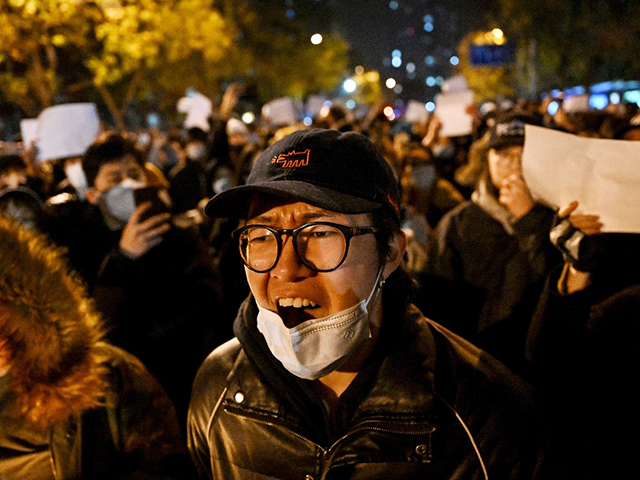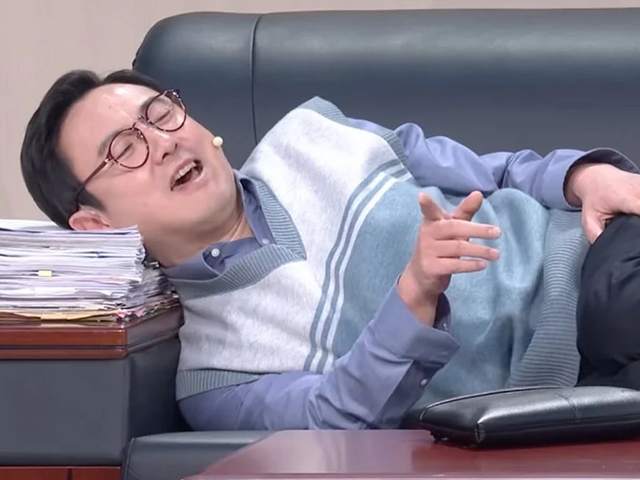Chinese state television aired a Spring Festival holiday gala on Saturday night that included a skit mocking lazy and incompetent low-level bureaucrats.
Judging from the response on social media, many viewers interpreted the skit as implicitly scapegoating local officials for causing the coronavirus disaster that has been sweeping the country since late last year.
The skit called “Pothole,” performed by a group called Mahua FunAge, became an instant sensation on Chinese social media. Discussions of the skit racked up over 800 million views in less than 24 hours on Weibo, China’s heavily censored version of Twitter.
The South China Morning Post (SCMP) summarized the skit as a lazy civil servant ignoring a hole in the road he should have fixed, perpetually trying to put the work off on others and blame them for the persistent annoyance of the pothole, until his boss goes undercover as an angry member of the public to catch him making excuses.
The two key moments in the skit were the lazy bureaucrat’s explanation for why he works as little as possible – “My motto is if I do more, I make more mistakes; if I do less, I make fewer mistakes; if I do nothing, I make no mistakes” – and his effort to blame members of the public for falling into the pothole he refuses to fix.
These details just happen to dovetail perfectly with the Chinese Communist Party’s official narrative that the coronavirus disaster was caused by local officials who were “lying flat,” a Chinese euphemism for laziness that essentially means “lying down on the job” – something the skit literally shows its goofy villain doing on his office couch while he makes excuses.
When the hapless civil servant shifted blame to the people, he said they had “low prevention awareness” of the pothole they kept stepping in. This was the exact phrase used by officials in Urumqi, the capital city of what China calls Xinjiang province, when they blamed the victims of a deadly apartment fire in late November for getting themselves killed.

Protesters march along a street during a rally for the victims of a deadly fire as well as a protest against China’s harsh coronavirus restrictions in Beijing on November 28, 2022. (Noel CELIS/AFP)
In other words, the officials said the victims died because they were ignorant of fire safety procedures. The actual reason was that the exits from the building were sealed due to a coronavirus lockdown.
Public outrage over the fire rapidly spread beyond Urumqi to become an amazingly large and vigorous protest movement against dictator Xi Jinping. The “lying flat” narrative about lazy and inept local officials is a way of letting Xi and other Communist Party leaders off the hook.
![Anti-communist banner in Beijing. Reads: “No PCR tests, but food; no lockdowns, but freedom; no lies, but respect; no Cultural Revolution, but reform; no dictator, but vote; no [to being] slaves, but we the people.”](https://media.breitbart.com/media/2022/10/China-Protest-1.jpg)
Anti-communist banner in Beijing. Reads: “No PCR tests, but food; no lockdowns, but freedom; no lies, but respect; no Cultural Revolution, but reform; no dictator, but vote; no [to being] slaves, but we the people.” (Bill Birtles/Twitter)
The Central Commission for Discipline Inspection (CCDI) appeared to agree. On its official website on Sunday morning, the Communist Party’s anti-corruption agency said the skit was not only funny, but cutting as well.
“It vividly depicts a lying-flat cadre who lacks a sense of responsibility and disregards public grievances while looking for glorified excuses, such as the public’s ‘low awareness to prevent potential road risks’,” the CCDI said.
“It is so sarcastic that we are at a loss as to whether to cry or laugh.”
The CCDI promised to hunt down and punish “lying-flat officials,” which drained the “Pothole” skit of whatever yuks it might have possessed until that moment.
“Lying flat” is also a phrase often used by angry Chinese citizens to describe the abrupt end of lockdown policies after the December protests, with absolutely no planning for how the vast nation would transition to less onerous pandemic control measures, and no preparation for the huge spike in coronavirus cases and deaths experienced across the country. The “Pothole” skit is clearly an effort to redirect that public anger toward disposable low-ranking bureaucrats instead of top Chinese Communist Party officials.
The SCMP observed that a good deal of the fervent online activity over the “Pothole” skit came from cynics who saw exactly what the Communist leadership is attempting to do.
“At last, the Spring Festival gala has the courage for sarcasm,” sighed one sarcastic commentator.
The UK Times quoted some Weibo users who found it interesting that their authoritarian government would permit any satire of itself at all. These commentators applauded the skit as “bold” and “realistic,” even if its ultimate goal was to channel public anger away from higher-ranking officials.

COMMENTS
Please let us know if you're having issues with commenting.